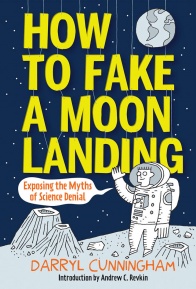No, it’s not an instruction book, and you may be clicking away already. But Darryl Cunningham’s “How To Fake A Moon Landing” is indispensable – a pithy non-fiction comic that takes science denial to the mat.

Written and illustrated by Darryl Cunningham
Is hydro-fracking safe? Is climate change real? Did the moon landing actually happen? How about evolution: fact or fiction? Author-illustrator Darryl Cunningham looks at these and other hot-button science topics and presents a fact-based, visual assessment of current thinking and research on eight different issues everybody’s arguing about. His lively storytelling approach incorporates comics, photographs, and diagrams to create substantive but easily accessible reportage. Cunningham’s distinctive illustrative style shows how information is manipulated by all sides; his easy-to-follow narratives allow readers to draw their own fact-based conclusions. A graphic milestone of investigative journalism!
Published by Abrams Books – and known by the somewhat less inflammatory title “Science Tales” in the UK – “How To Fake A Moon Landing” is a work in defense of critical thinking, and of science generally. A preface further refines this purpose: in an age where it’s easy to google anything you like, and find a sciencey-sounding defense of it somewhere, it’s essential to distinguish between the living, growing organism that is scientific thought and the more rigid entity that is pseudoscience. In taking on eight issues that receive substantial media attention, Cunningham delineates where science ends and dogma, corruption, or hype begin.
Visually, the book has a bright, anarchic look; Cunningham’s cartoons are intermingled with tinted photographs, and they’re all held together by tight layouts that make Cunningham’s arguments easy to follow. And while this format is unconventional, it flows surprisingly well. Cunningham’s art, with its minimal, wobbly lines and austere-looking narrator, brings a wacky, Far-Side-esque feel to the comic, while the photographs impart range. Getting an actual look at spinal X-rays while Cunningham unpacks the thinking behind chiropractics makes for a nice reminder of the empirical in a field that – well, I’ll let you read the book.
Cunningham’s arguments proceed relentlessly, offering examples and counter-examples, illustrations and explications, and chapters often end suddenly, having made their point in no uncertain terms. The reading experience can be overwhelming, even intimidating. And if you’re one to get riled up by your own memories involving science and its fakey second cousin, you may find yourself angry by the time you put the book down. On the other side of the coin – and even the foreword warns that the reader may not agree with Cunningham’s assessments – I’m sure many readers will find some point or other to dispute in his arguments. These are, after all, hot-button issues, and distilling them down to short chapters makes them all the more likely to provoke debate.
Here’s where I falter, though, in that I’m not sure who Cunningham’s ideal audience is. My feeling is that avid science deniers will not be picking up this book; rather, it’ll be those who don’t need convincing. And what is the endgame there?
I can only answer for myself in saying that it’s a pleasure to see concepts elegantly explored, whether or not you need persuading, and it’s always useful to gain a clearer picture of a concept you may only have a headline understanding of. But my feeling is a book like this exists in a sort of limbo wherein the people it aims to convince are not reading it. Maybe it’s best off with a younger audience – older high school? – although, again, I imagine it’s a sciencey kid who would pick it up in the first place.
It’s also not without its flaws. Beginning with the moon landing – and conspiracy theories generally – feels like an odd choice, if only because, to my way of thinking, conspiracy theories exist on a different plane from pseudoscience. Most people don’t use homeopathy for its entertainment value; however, most people I know who read up on conspiracies do so because they enjoy the cosmic, mind-exploding feeling it gives them – all without necessarily subscribing to the theory itself. I may be alluding to a fairly recent subculture, I’m not sure. But maybe a whole book devoted to debunking conspiracy theories would make more sense than discussing a few in a book that focuses on more popular claims.
Visually speaking, the way Cunningham splits sentences across several panels sometimes feels counter-intuitive, creating pauses and rifts that get in the way of clarity. And while the photograph-and-illustration format is entertaining, I sometimes found myself wanting more art – heck, maybe even a little more ornament – to glue the collection together thematically.
This is a rigorous, well-structured, concise book that does what it sets out to do – refreshing in itself – and which is sure to start an argument if you bring it up in any kind of company. And the crucial things in life make grown-up parties awkward, so you can take that as my invitation to fake your own moon landing – I mean, pick up Darryl Cunningham’s book.






